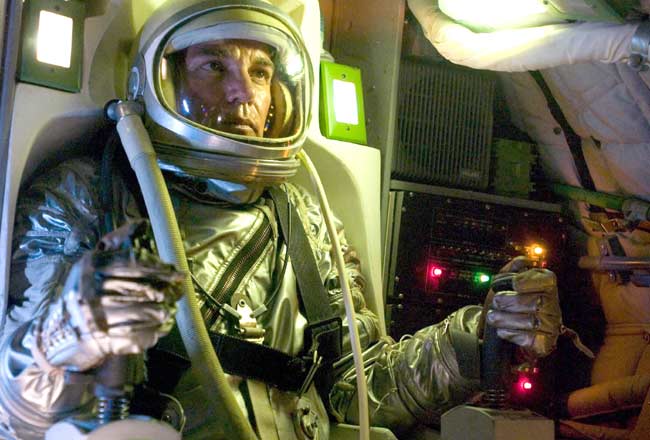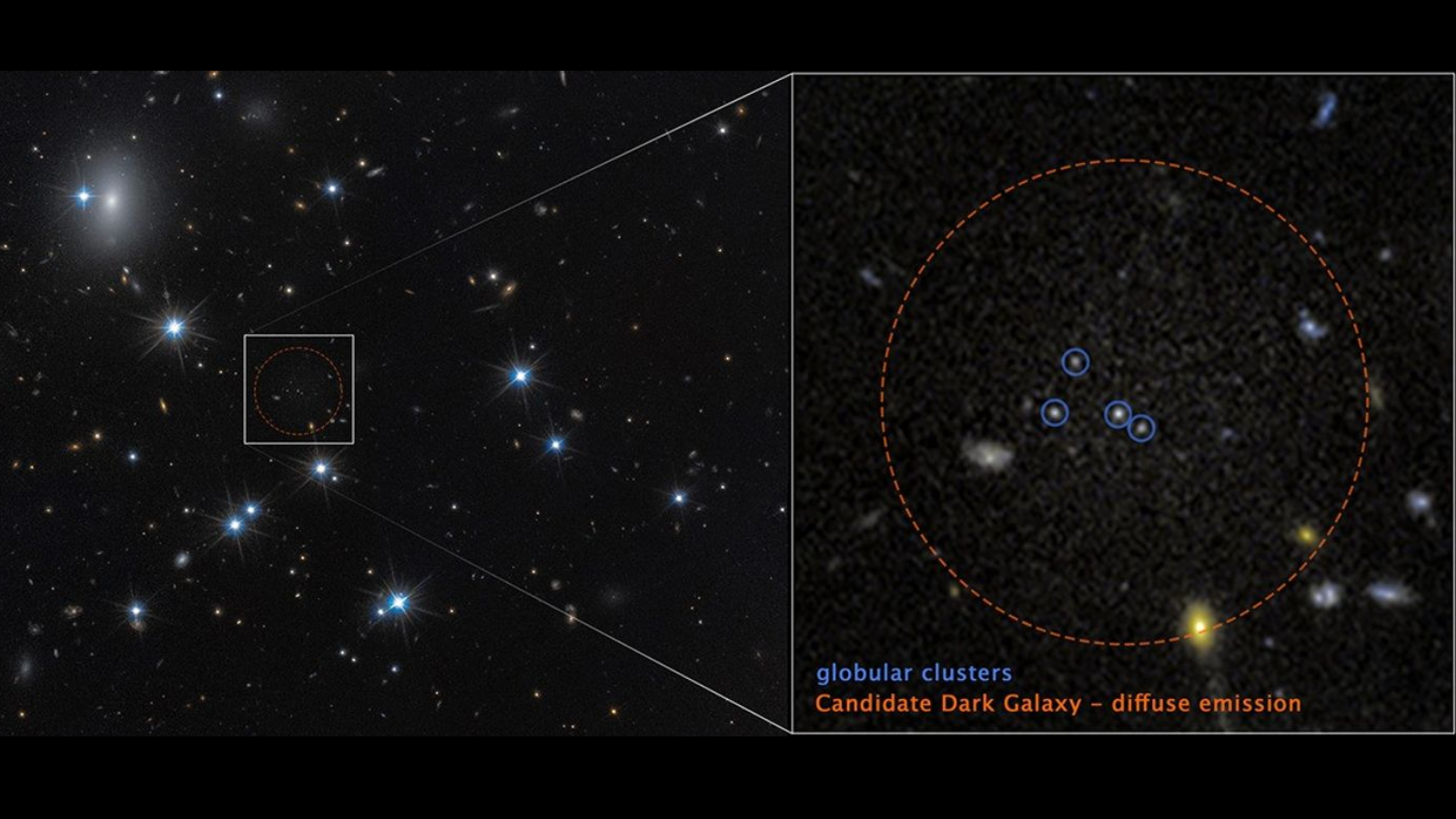Film Review - The Dream is Alive: 'The Astronaut Farmer'

Breaking space news, the latest updates on rocket launches, skywatching events and more!
You are now subscribed
Your newsletter sign-up was successful
Want to add more newsletters?

Delivered daily
Daily Newsletter
Breaking space news, the latest updates on rocket launches, skywatching events and more!

Once a month
Watch This Space
Sign up to our monthly entertainment newsletter to keep up with all our coverage of the latest sci-fi and space movies, tv shows, games and books.

Once a week
Night Sky This Week
Discover this week's must-see night sky events, moon phases, and stunning astrophotos. Sign up for our skywatching newsletter and explore the universe with us!

Twice a month
Strange New Words
Space.com's Sci-Fi Reader's Club. Read a sci-fi short story every month and join a virtual community of fellow science fiction fans!
It's astory that should be familiar to any space exploration enthusiast.
In spite ofthe obstacles, including the laws of physics, political pressure and a limitingbudget, a small but spirited group launches their dreams. It's thestory behind the current New Space movement.It's the story behind NASA's past andfuture.
It's thestory of "The Astronaut Farmer." [IMAGES:View scenes from the film.]
A man,his horse and his rocket
CharlesFarmer -- portrayed with just the right mix of quirkiness and sentimentality byactor Billy Bob Thornton [image]-- was well on his way to being an astronautwhen he gave up on his dream of flying in space to return to his family's Texasranch [image].Years later, he is married to a supportive and beautiful wife (Virginia Madsen)and together they have three children.
Farmer'sfascination with space is far from a distant memory, though. His first born, ason, is named Shepard after the nation'sfirst astronaut. Farmer has acquired his own vintage spacesuit, which he ishappy to wear for a visit to his daughter's classroom.
And oh yes,he's built a rocket in his barn [image].
Breaking space news, the latest updates on rocket launches, skywatching events and more!
Not a modelrocket, of the type many astronaut-hopefuls build and launch from cardboardtubes and balsa wood fins, but a towering, faithful and hopefully workingreplica of NASA's first man-rated orbital booster, the Mercury-Atlas.
It is herethat we, the audience, join Farmer as "The Astronaut Farmer" begins. We don'tknow how he built the rocket, though we learn it was at a great expense. And ifhis financial troubles aren't enough of a challenge, Farmer has just drawn theattention of the Federal Aviation Administration (FAA), which doesn't quiteknow what to make of the ex-astronaut turned cattle rancher, but is adamantabout dashing any dreams of Farmer's rocket ever leaving the ground.
NewSpacevs. NASA vs. the nation
Farmer'splight could easily be interpreted as analogous to the NewSpace movement.Privately funded rocket developers seeking to launch private payloads and spacetourists know all too well the struggles presented by tightening budgets andpolitical regulation. It was only within the past several years that theindustry and government have come to agreements that allow forward movement onthe development of private space-bound rockets.
"Farmer's" FAA is far less forgiving, thoughthose in the industry may find familiarity with actor J.K. Simmons' portrayalof agency chief Jacobson.
A strongerparallel between the film and real life is far subtler.
Farmer'ssuccess or failure is based on his belief in a dream. As he passionatelydefends his flight plan, Farmer says, "If we don't have our dreams, wehave nothing."
Beyond anyof the justifications given for NASA's present and future programs is the hopeof a better future for humankind. Like Farmer, NASA faces the challenges ofengineering new designs based its prior successes, a shrinking budget and agovernment that seems pre-occupied with deconstructing the past rather thanexploring the future.
Farmer'sfamily, who dreams with and for him, is not unlike NASA's workforce and itssupporters. They understand the dream, even if those around them -- Farmer'sneighbors and the media who flock to his ranch -- do not.
"Somewherealong the line, we stopped believing that we can do anything," saysFarmer. So, could be argued, has the nation, if not the world. We went to the Moon in 1969 because we didn't know wecouldn't do so. Today, politicians and the public are too quick to assume thatif a dream seems impossible, then it likely is.
Whetherfilmmakers Michael and Mark Polish had NewSpace or NASA in mind while craftingtheir story is unknown, though there are hints for the latter. The use of theiconic Atlasrocket and Mercury silver spacesuit elicits the glory of NASA's past,nearly 50 years ago. If "The Astronaut Farmer" were a NewSpace parable, onewould expect a rocket design that derives little from government influence.
Said MarkPolish in Warner Brothers' production notes, "The story was sparked by ourinterest in space exploration, but beyond that, it's about a need to dream ofadventures, whether it's Neil Armstrong or Lewis and Clark. I think that, as asociety, we've stopped dreaming about exploration."
Thedream is alive
Even if youignore the potential metaphors presented by the film, it is difficult whilewatching "The Astronaut Farmer" to not start dreaming alongside Farmer and hisfamily.
With its inspirationalcinematography, which transforms the southwestern desert into as foreign andyet, at the same time, familiar setting as the lunar surface, the film'sgreatest strength is its strong cast of characters -- characters with whomanyone who has dreamt of achieving the impossible can relate. Thornton andMadsen deliver in their roles, as does the two young girls who play theincurably sweet Farmer daughters.
"TheAstronaut Farmer" is an engaging fantasy that draws upon the American spiritfor exploration: a spirit that was once strong within the nation's support forNASA and could be again, today.
Enter to win an official "The Astronaut Farmer" movieposter and Mercury-Atlas memorabilia in collectSPACE and Warner Bros. Pictures'contest. (Contestentry deadline: 11:59 p.m. CST Friday, February 23.)
- IMAGES: "The Astronaut Farmer" Gallery
- Mercury-Atlas Rocket Takes Center Stage in 'Astronaut Farmer'
- VOTE for The Best Space Movies of All Time
Copyright 2007 collectSPACE.com. All rights reserved.

Robert Pearlman is a space historian, journalist and the founder and editor of collectSPACE.com, a daily news publication and community devoted to space history with a particular focus on how and where space exploration intersects with pop culture. Pearlman is also a contributing writer for Space.com and co-author of "Space Stations: The Art, Science, and Reality of Working in Space” published by Smithsonian Books in 2018.
In 2009, he was inducted into the U.S. Space Camp Hall of Fame in Huntsville, Alabama. In 2021, he was honored by the American Astronautical Society with the Ordway Award for Sustained Excellence in Spaceflight History. In 2023, the National Space Club Florida Committee recognized Pearlman with the Kolcum News and Communications Award for excellence in telling the space story along the Space Coast and throughout the world.

